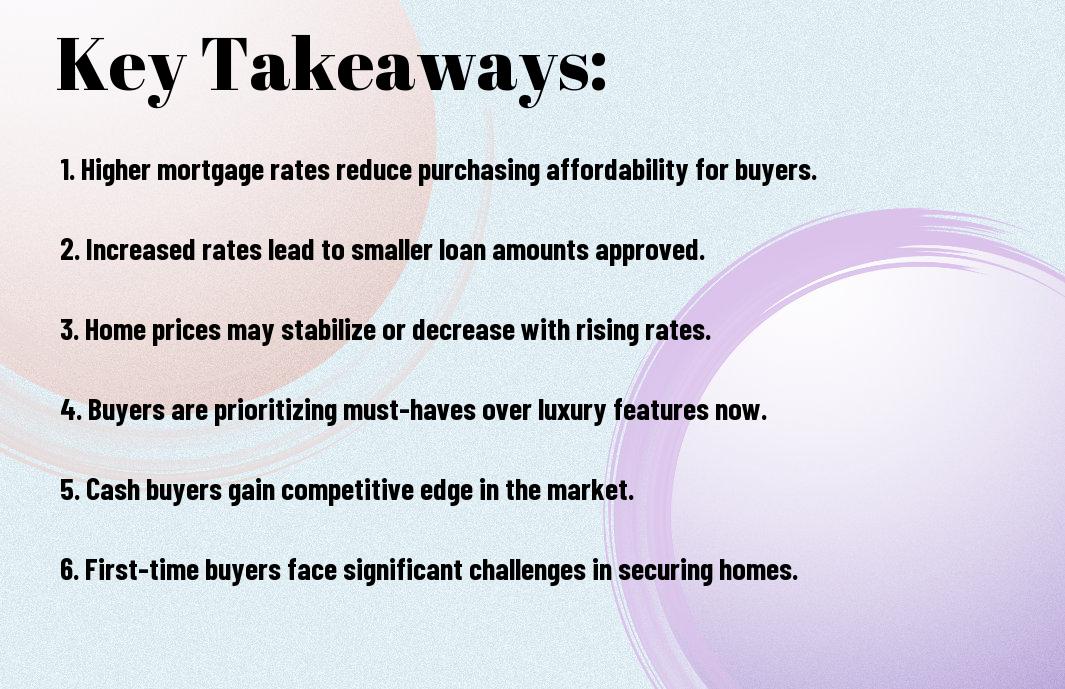Many factors influence your decision to buy a home, and one of the most significant is the current state of mortgage rates. As interest rates fluctuate, they can dramatically impact your purchasing power, making it crucial for you to stay informed about how these changes affect your ability to secure financing and afford a property. In today’s market, understanding the relationship between mortgage rates and your potential buying power will help you make more informed decisions as you navigate the real estate landscape.
Key Takeaways:
- Higher mortgage rates can reduce overall purchasing power, leading buyers to reconsider their budget and potentially seek smaller or less expensive properties.
- Many buyers may face increased monthly payments due to elevated rates, which can impact their ability to qualify for a mortgage, shifting demand towards lower-priced homes.
- The current market dynamics may lead to changes in negotiation strategies, with buyers seeking concessions or incentives as they navigate the higher cost of borrowing.
Understanding Mortgage Rates
A mortgage rate is the interest charged on a home loan, significantly influencing your monthly payments and overall affordability. Understanding these rates is imperative for making informed decisions when purchasing a property. Rates can vary based on numerous factors, including your credit score and market conditions. Being aware of how they function helps you evaluate your buying power and determine the best time to secure a mortgage deal.
Definition and Importance
On a basic level, mortgage rates determine the amount of interest you will pay over the life of your loan. These rates are vital because they directly impact your monthly mortgage payment, overall loan costs, and how much house you can afford. Understanding mortgage rates aids you in planning your finances effectively and avoiding surprises when navigating the real estate market.
Current Trends in Mortgage Rates
One significant trend in today’s housing market is the fluctuation of mortgage rates, influenced by economic indicators and Federal Reserve policies. These changes are making it imperative for you to stay informed so you can secure the best financing options available for your real estate purchase.
For instance, mortgage rates have seen notable ups and downs over the last year, making it challenging for many buyers to strategize their purchases. Recent data shows a gradual increase in rates, which can lead to higher monthly payments and potentially reduce your home-buying budget. Staying attuned to these trends can help you make better timing decisions when entering the market or refinancing your existing mortgage. By understanding current rates, you can enhance your home-buying strategy and navigate financial options more effectively.
Real Estate Market Overview
It’s important to understand the current landscape of the real estate market. As mortgage rates fluctuate, they impact your buying power and the decisions made by potential buyers and sellers alike. With shifting dynamics, you may find opportunities to negotiate better terms or face challenges in a competitive environment. Being informed about these trends can help guide your real estate endeavors effectively.
Supply and Demand Dynamics
Below the surface of price changes, supply and demand play a vital role in the real estate market. When demand exceeds supply, you may experience heightened competition, driving prices up. Alternatively, when supply outstrips demand, you might find more favorable conditions for negotiating your home purchase. Understanding these dynamics allows you to position yourself strategically in the market.
Regional Variations in Real Estate Prices
At the heart of real estate trends are the regional variations that affect price dynamics across different areas. Depending on where you live or are considering buying, local economic conditions, job growth, and housing inventory can significantly impact real estate prices. Each region presents unique opportunities and challenges that you need to take into account when making your buying decisions.
And, as you analyze these regional variations, consider that metropolitan areas often see different price trends compared to suburban or rural locations. Urban centers may have higher demand due to job opportunities and amenities, leading to increased prices. In contrast, suburban areas might offer more space at a lower cost, attracting families. By understanding these local factors, you can better assess your options and make informed decisions that align with your financial goals.
Impact of Mortgage Rates on Purchasing Power
For many buyers, mortgage rates significantly affect purchasing power. As these rates fluctuate, they can either enhance or limit what you can afford in the real estate market. For further insights, you can read more about this in Ask O: How Do Mortgage Interest Rates Affect Buying Power?.
How Rates Influence Affordability
Between rising mortgage rates and the overall cost of living, your affordability in the housing market can shift dramatically. Higher rates mean higher monthly payments, which may lead you to adjust your budget or consider lower-priced properties. Consequently, this can impact your homeownership plans.
Buyer Behavior in Response to Rate Changes
After rates increase, you may notice a change in buyer behavior as many prospective homeowners reassess their options. With increased borrowing costs, buyers often choose to act more cautiously, leading to potential slowdowns in market activity and adjustments in purchase timelines.
Buyer sentiment can also shift in response to rate hikes. You may find that others are waiting for rates to stabilize before making a purchase. This hesitation can create a more competitive landscape when rates eventually drop, prompting more buyers to enter the market at once, which could drive prices up. Understanding these dynamics is necessary to making informed decisions as you navigate your home buying journey.
Financing Trends and Alternatives
Now, as mortgage rates fluctuate, it’s imperative to stay informed about financing trends and explore various alternatives that can fit your budget and needs. You may find that non-traditional financing options are becoming increasingly popular, allowing you to navigate the complexities of today’s real estate market with greater ease. Understanding these trends can enhance your buying power and help you make more informed decisions.
Alternative Mortgage Products
The market is seeing a rise in alternative mortgage products, which offer flexible terms and unique features tailored to diverse buyer profiles. Options like adjustable-rate mortgages (ARMs), interest-only loans, and shared equity agreements can provide pathways to homeownership, even in a challenging rate environment. Evaluating these choices can empower you to align your financial strategy with your home-buying aspirations.
Impact of Credit Scores on Mortgage Access
Alternative mortgage products often come with varying requirements related to your credit score, which can significantly affect your mortgage access. A higher credit score typically opens doors to more favorable mortgage terms, while a lower score might limit your options.
Understanding the factors influencing your credit score is vital for enhancing your mortgage accessibility. Items such as payment history, credit utilization, and the length of your credit history all play significant roles in determining your score. By actively managing these aspects, you can improve your credit standing, potentially securing better mortgage rates and access to a wider range of financing options in your home search. This proactive approach can greatly enhance your overall buying power in today’s competitive real estate market.
Predictions and Future Outlook
Once again, the future of mortgage rates remains uncertain, with many experts pointing to various factors that could influence the market. Economic recovery, inflation rates, and potential regulatory changes will play significant roles in determining the trajectory of interest rates. As you navigate your real estate decisions, staying informed about these trends will be crucial to understanding how they may impact your buying power in the coming months.
Expert Opinions on Rate Trends
About the future of mortgage rates, industry experts provide a range of insights. Some predict a gradual increase, while others anticipate more stability in the near term. Be sure to keep abreast of expert analyses, as their forecasts can help you time your purchase and secure the best possible financing options.
Implications for Future Buyers
Behind the shifting landscape of mortgage rates, your position as a future buyer is influenced significantly by these trends. As rates fluctuate, the cost of borrowing can directly impact your budget and the type of property you can afford.
Due to the anticipated changes in mortgage rates, you may find that your ability to purchase a home could be affected over the coming months. If rates rise, your monthly payment increases, potentially narrowing your options. However, if they stabilize or decline, you might discover improved buying power. Understanding these implications will allow you to make more informed decisions, so you can maximize your investment when you choose to enter the real estate market.
Strategies for Homebuyers in a High Rate Environment
After acknowledging the challenges posed by high mortgage rates, you can implement certain strategies to enhance your homebuying potential. Staying informed about rate fluctuations, exploring loan options, and considering alternative financing could significantly improve your financial position in today’s market. Additionally, collaborating with a knowledgeable real estate agent can help you identify properties that suit your budget while maximizing your buying power.
Tips for Maximizing Buying Power
To make the most of your buying power, focus on these key strategies:
- Improve your credit score before applying.
- Consider government-backed loans for better terms.
- Save for a larger down payment to reduce loan size.
- Negotiate closing costs with sellers.
Recognizing your financial position and utilizing these tips can help you navigate a high-rate environment effectively.
Long-term vs. Short-term Considerations
Considerations about whether to buy now or wait involve evaluating both immediate and future financial implications. Assessing your current financial situation and future income projections can guide your decision-making process. Look closely at how long you plan to stay in your new home and weigh potential market fluctuations against your long-term goals.
Even if higher rates deter some buyers, it’s vital to examine the long-term benefits of homeownership, such as equity growth and stability. Many find that investing in a home provides consistent value over time despite short-term rate challenges. Balancing your immediate needs with future considerations can help you make a more informed decision about entering the real estate market.
Summing up
From above, it’s clear that mortgage rates significantly influence your real estate buying power in today’s market. As rates rise, your monthly payments increase, which may limit the homes you can afford or require you to adjust your budget. Staying informed about current rates and trends can help you make strategic decisions in your home-buying journey, enabling you to maximize your investment potential while navigating the complexities of the market. Understanding these dynamics ensures you are well-prepared to make choices that align with your financial goals.
Q: How do rising mortgage rates impact a buyer’s purchasing power in today’s real estate market?
A: When mortgage rates rise, the cost of borrowing increases, which directly affects a buyer’s ability to afford a home. With higher rates, monthly mortgage payments will be more expensive, leading buyers to either adjust their home price range downwards or seek out smaller, less expensive properties. This shift can reduce the overall demand for higher-priced homes, potentially slowing down price growth in those segments of the market.
Q: How can buyers mitigate the effects of higher mortgage rates on their home-buying experience?
A: Buyers can take several steps to offset the impact of higher mortgage rates. Firstly, they can improve their credit score to qualify for lower interest rates. Secondly, they can explore various loan products, such as adjustable-rate mortgages (ARMs) that may offer a lower initial rate than fixed-rate mortgages. Additionally, making a larger down payment can reduce the loan amount and consequently the monthly payments. Finally, working with a knowledgeable real estate professional can help buyers navigate their options more effectively in a shifting market.
Q: Are there any long-term effects of current mortgage rates on the real estate market?
A: Yes, the current mortgage rates can have long-term implications for the real estate market. Higher rates may lead to a slowdown in home sales as buyers retreat due to affordability concerns. This can ultimately create a more stable market in the long run, as home price growth may level off or even decline. Additionally, changing demographic trends, alongside fluctuating interest rates, can affect housing supply and demand, influencing future construction and investment in real estate developments.







